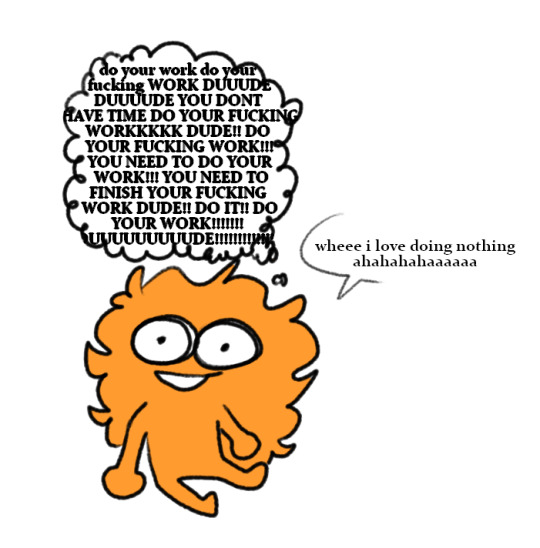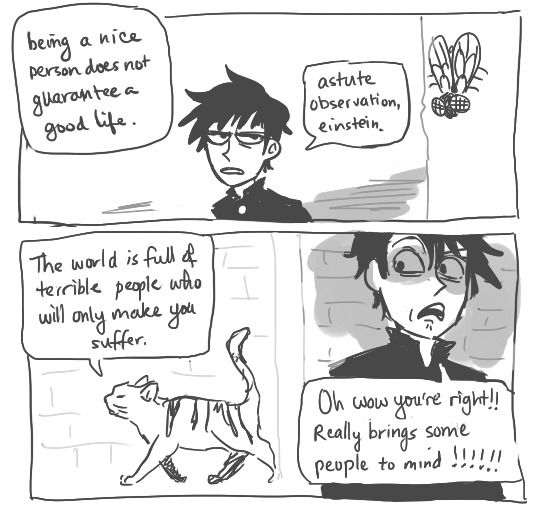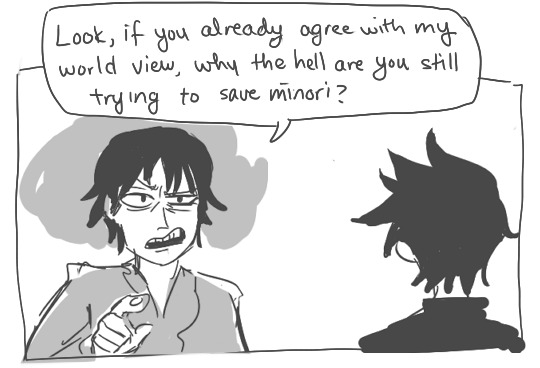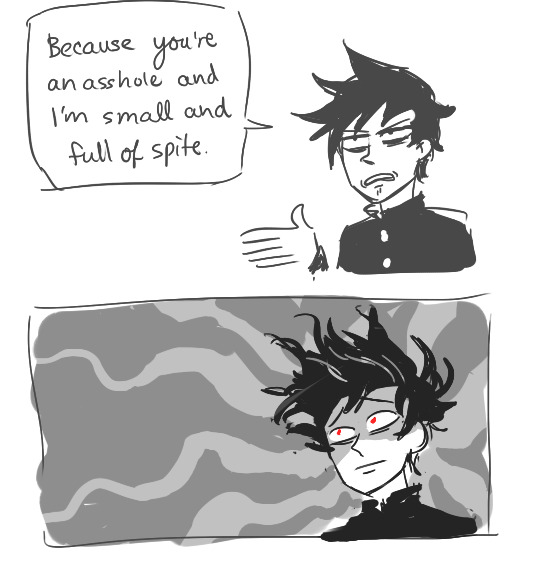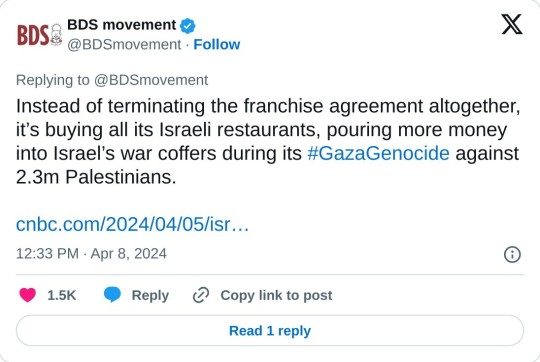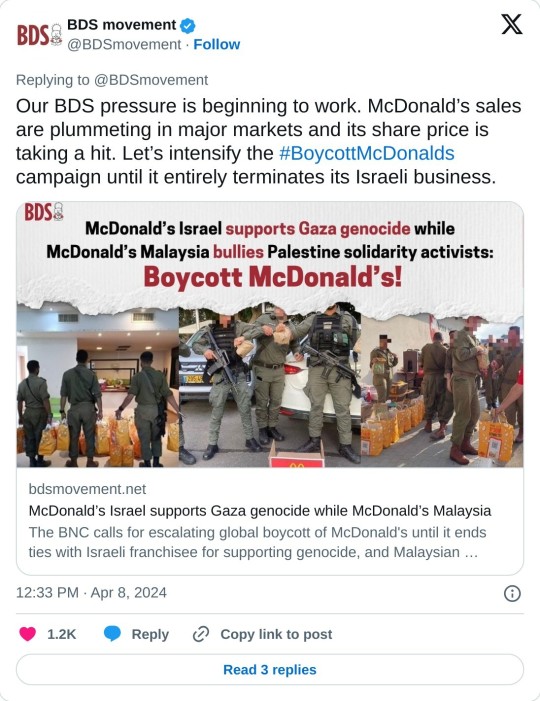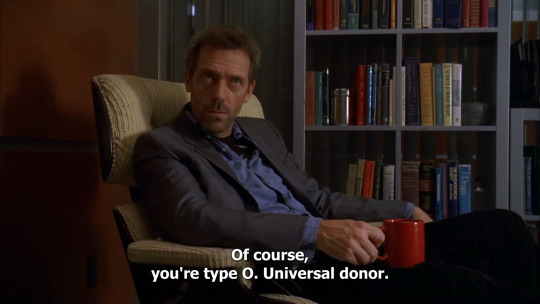Text


If anyone is looking for a keffiyeh, a friend of a friend in Palestine has partnered with an existing factory after their tourism business has been out of work. They finally got a website and a distributor and you can buy them here
1K notes
·
View notes
Text
Statistics confirm this reality: suicidal people hide in order to end their lives (Beattie and Devitt, 2015; WHO, 2014; Peck, 2003). My argument is that they do not speak because they fear the negative consequences of doing so in a suicidist environment. Indeed, as empirical research shows, suicidal people, as is often the case for those considered "mad" and "crazy," are institutionalized and drugged against their will, are excluded from insurance programs, are either not hired for new jobs or fired from their current jobs, are expelled from university campuses, have their parenting rights revoked, are seen as incapable of sound judgment and of consenting or not to healthcare, and are subjected to other unfair treatments (Beattie and Devitt, 2015; Hewitt, 2010; 2013; Joiner, 2005; Stefan, 2016; Szasz, 1999; Webb, 2011).
— Suicidism: A new theoretical framework to conceptualize suicide from an anti-oppressive perspective by Alexandre Baril
645 notes
·
View notes
Link
Like today’s titans of industry, planters understood that their profits climbed when they extracted maximum effort out of each worker. So they paid close attention to inputs and outputs by developing precise systems of record-keeping. Meticulous bookkeepers and overseers were just as important to the productivity of a slave-labor camp as field hands. Plantation entrepreneurs developed spreadsheets, like Thomas Affleck’s “Plantation Record and Account Book,” which ran into eight editions circulated until the Civil War. Affleck’s book was a one-stop-shop accounting manual, complete with rows and columns that tracked per-worker productivity. This book “was really at the cutting edge of the informational technologies available to businesses during this period,” Rosenthal told me. “I have never found anything remotely as complex as Affleck’s book for free labor.” Enslavers used the book to determine end-of-the-year balances, tallying expenses and revenues and noting the causes of their biggest gains and losses. They quantified capital costs on their land, tools and enslaved workforces, applying Affleck’s recommended interest rate. Perhaps most remarkable, they also developed ways to calculate depreciation, a breakthrough in modern management procedures, by assessing the market value of enslaved workers over their life spans. Values generally peaked between the prime ages of 20 and 40 but were individually adjusted up or down based on sex, strength and temperament: people reduced to data points.
1K notes
·
View notes
Photo




labs that are also churches. to me
(1. annie dillard, teaching a stone to talk 2. the deep underground neutrino experiment, a.k.a. DUNE 3. the large hadron collider 4. the sudbury neutrino observatory)
57K notes
·
View notes
Text
Is Israeli academia about to enter a whole new phase? All signs are that it already has. In the past few weeks, Haaretz spoke with more than 60 Israeli scholars from a wide range of disciplines and academic institutions, from young scientists and university presidents about their experiences with colleagues abroad since the war broke out in the Gaza Strip after Hamas' massacre on October 7.
They recounted dozens of incidents: cancellation of invitations to conferences, a freeze on their appointments in foreign institutions, rejection of scientific articles on political grounds, disruption of lectures abroad, cessation of collaborative efforts with colleagues abroad, refusal by such colleagues to take part in the promotion process their Israeli counterparts must undergo at local institutions, and even a sweeping boycott of local colleges and universities. The following examples, all from recent months and backed up by documents and emails, are being made public here for the first time. The plethora of events leaves no room for doubt: Israel is feeling the brunt of an unprecedented academic boycott, which is only gathering momentum.
…
It once seemed as if the social sciences and humanities are more vulnerable to political struggles. Indeed, such departments in Israel were familiar with the impact of the boycott, divestment and sanctions movement long before October 7. However, the cessation of collaboration – whether in conducting research, co-authoring articles or in other areas – is now being seen as a widespread phenomenon in all fields.
A few months ago, Nir Davidson, a physics professor at the Weizmann Institute of Science, suggested to an Italian colleague that they try together to request a grant from a competitive research foundation. "Because of the atrocities your country is perpetrating against innocent civilians, thousands of professors and researchers have signed a petition calling for all research collaboration to be blocked," the colleague replied, noting that he "fondly recalls" a visit he made to Israel in 2020, but adding, "I'm afraid that what your country has done and is continuing to do will never be forgotten or forgiven."
About a month ago, a scientist from Ben-Gurion University of the Negev was ejected from an international group that submits research proposals to the European Union in the realm of environmental studies. The explanation he was given by one of his colleagues was, "I'm really sorry, but I'm going to have to not select Israel as a partner for the project. In fact, some partners do not wish to be involved in the project if Israel is a partner, particularly given the current political context. I am truly sorry, and I hope that we will have the opportunity to work together on another research project. Thank you for your understanding and I wish you all the best for the future."
…
"I am writing to let you know that I have decided to step down from the Ph.D. committee [reviewing a student's thesis]," a foreign social sciences scholar wrote the Hebrew University recently. "Following the university's recent declaration of commitment to Zionism in the context of the war that is raging in Gaza, I feel I can no longer be associated with this institution. I have enjoyed working with you all and it is with a heavy heart that I am making this decision."
The "commitment to Zionism" the professor cited was part of the fierce public condemnation the university issued against sharp remarks by Israeli-Palestinian Prof. Shalhoub-Kevorkian, of its law faculty, against Israel's conduct in the war in Gaza. "As a proud Israeli, public, and Zionist institution," the university stated, it condemned her comments and suspended her, before reinstating her two weeks later.
The email from the foreign academic who asked to stop advising the Hebrew University doctoral student is only one example of an apparently growing phenomenon whereby scholars overseas no longer want to help prepare the next generation of lecturers and researchers at Israeli institutions: Sources at a few such institutions admit that they find it increasingly difficult to obtain the letters of evaluation from academics abroad that must be submitted in advance of discussions of staff promotions in Israel.
For the present, it looks as though the latter trend is particularly noticeable in the social sciences and the humanities: in sociology and anthropology, Middle Eastern studies and literature. But according to a source at one university, the field of law is also falling victim to such dwindling collaboration with foreign schools.
…
"If the Israeli government commits irrevocably to either a two-state (within 1967 borders) or one-state solution in which all Palestinians in both Israel and the occupied territories have equal rights to Israelis – I will be happy to engage with Israeli institutions," a senior researcher at a prestigious institution in Europe wrote recently, in response to a request to write an evaluation for an Israeli academic. "Until that day, no." Another European academic wrote: "I do not believe that this suffering of civilians can be justified and I believe that Israel is not acting in accordance with international human rights law. In light of that, I feel I cannot collaborate with any Israeli institution at the moment."
…
"The dam has burst," Drori declares now. "Talking about an academic boycott of scientists in Israel has become legitimate. It's a whole new world. We are in a very extreme situation, and I don't know whether and how it will be possible to reverse things. The boycott is severing our ability to be involved in the forefront of research. All scientific research that does not involve the international community is research that is less good. The severance from the world is suffocating us."
If the pool of international experts who are willing to cooperate with Israel does continue to shrink, Israeli academics will face discouraging alternatives: to approach less senior academics from less well-regarded universities (which, according to a knowledgeable source, is already happening in some cases), or to increase the proportion of assessments provided by local faculty – not a particularly palatable solution.
…
A number of universities and academic organizations in Belgium, Spain, Italy and Norway recently announced full boycotts or a suspension of ties with Israeli institutions until they receive clarifications with regard to topics ranging from the state of academic freedom on their campuses, to their moral, financial and material support for Israel's defense forces. For one, Ghent University recently requested such information from its counterpart in Haifa.
…
"The best-case scenario is that within a short time we will return to some sort of stability," says American studies professor Milette Shamir, vice president of Tel Aviv University and director of its international academic collaborations. "Our standing in the world will be rehabilitated and we will be able to return to the situation we were in, to very extensive international activity."
But Shamir acknowledges that she "doesn't know whether that scenario is realistic." Two weeks ago, she was in Australia to attend an academic fair at the University of Sydney. When she arrived, pro-Palestinian demonstrators shouted that Tel Aviv University shares in crimes against the Palestinians and that all collaborations with Israel should end.
"The worst-case scenario is that we are headed in the direction of South Africa [in the apartheid period]," she says, "with boycotts that keep mounting to the point of paralyzing the system. The result will be a mortal blow to Israeli academia. It will take on a provincial character and we will not be able to integrate into the forefront of the world's research."
— 'I Won't Work With You. You're Committing Genocide': Israeli Academia Faces an Unprecedented Global Boycott. Or Kashti, Haaretz, April 14 2024
5K notes
·
View notes
Text
so: masking: good, unequivocally. please mask and please educate others on why they should mask to make the world safer for immune compromised people to participate in.
however: masking is not my policy focus and it shouldn't be yours, either. masking is a very good mitigation against droplet-born illnesses and a slightly less effective (but still very good) mitigation against airborne illnesses, but its place in the pyramid of mitigation demands is pretty low, for several reasons:
it's an individual mitigation, not a systemic one. the best mitigations to make public life more accessible affect everyone without distributing the majority of the effort among individuals (who may not be able to comply, may not have access to education on how to comply, or may be actively malicious).
it's a post-hoc mitigation, or to put it another way, it's a band-aid over the underlying problem. even if it was possible to enforce, universal masking still wouldn't address the underlying problem that it is dangerous for sick people and immune compromised people to be in the same public locations to begin with. this is a solvable problem! we have created the societal conditions for this problem!
here are my policy focuses:
upgraded air filtration and ventilation systems for all public buildings. appropriate ventilation should be just as bog-standard as appropriately clean running water. an indoor venue without a ventilation system capable of performing 5 complete air changes per hour should be like encountering a public restroom without any sinks or hand sanitizer stations whatsoever.
enforced paid sick leave for all employees until 3-5 days without symptoms. the vast majority of respiratory and food-borne illnesses circulate through industry sectors where employees come into work while experiencing symptoms. a taco bell worker should never be making food while experiencing strep throat symptoms, even without a strep diagnosis.
enforced virtual schooling options for sick students. the other vast majority of respiratory and food-borne illnesses circulate through schools. the proximity of so many kids and teenagers together indoors (with little to no proper ventilation and high levels of physical activity) means that if even one person comes to school sick, hundreds will be infected in the following few days. those students will most likely infect their parents as well. allowing students to complete all readings and coursework through sites like blackboard or compass while sick will cut down massively on disease transmission.
accessible testing for everyone. not just for COVID; if there's a test for any contagious illness capable of being performed outside of lab conditions, there should be a regulated option for performing that test at home (similar to COVID rapid tests). if a test can only be performed under lab conditions, there should be a government-subsidized program to provide free of charge testing to anyone who needs it, through urgent cares and pharmacies.
the last thing to note is that these things stack; upgraded ventilation systems in all public buildings mean that students and employees get sick less often to begin with, making it less burdensome for students and employees to be absent due to sickness, and making it more likely that sick individuals will choose to stay home themselves (since it's not so costly for them).
masking is great! keep masking! please use masking as a rhetorical "this is what we can do as individuals to make public life safer while we're pushing for drastic policy changes," and don't get complacent in either direction--don't assume that masking is all you need to do or an acceptable forever-solution, and equally, don't fall prey to thinking that pushing for policy change "makes up" for not masking in public. it's not a game with scores and sides; masking is a material thing you can do to help the individual people you interact with one by one, and policy changes are what's going to make the entirety of public life safer for all immune compromised people.
6K notes
·
View notes
Text
I think movies need more sex and i also think that actors need to be uglier and less in shape
21K notes
·
View notes
Text
it's so fucking frustrating to be in college and know everyone uses chatgpt and to be tempted by it constantly while also knowing intellectually that it doesn't work and it's a bad idea. like, i hang out in the library a lot, and i see people using chatgpt on assignments almost every day. and i know it isn't a good way to learn, because it's not really "artificial intelligence" so much as it is an auto text generator. and it gives you wrong information or badly worded sentences all the time. but every week i stare down assignments i don't want to do and i think man. if only i could type this prompt into a text generator and have it done in 10 minutes flat. and i know it wouldn't work. it wouldn't synthesize information from the text the way professors want, it wouldn't know how to answer questions, it just spits out vaguely related words for a couple paragraphs. but knowing my classmates get their work done in 10 minutes flat with it while i fight every ounce of attention deficit hyperactivity disorder in my body is infuriating.
27K notes
·
View notes
Text
26K notes
·
View notes
